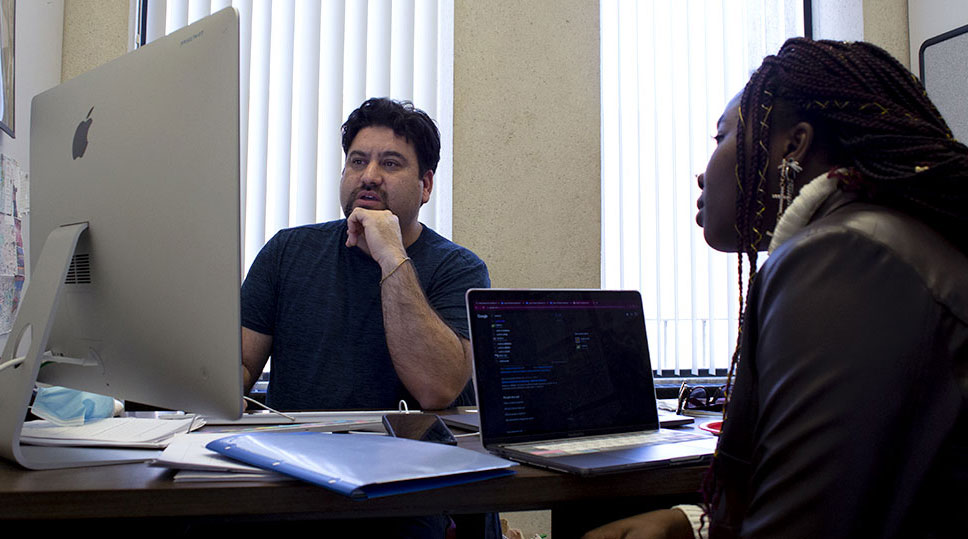Main Content
Ph.D. - Mass Communications and Media Arts

The graduate programs in the College of Mass Communication and Media Arts develop teaching, research, and creative work that interrogates the construction, reception, and social impact of mass media forms and texts. Our work uniquely blends methods from the arts, humanities, history, theory, and social sciences. The faculty seek to nurture an intellectual and creative community attuned to global social changes, as we respond to new ways of creating and analyzing media.
Our doctoral program engages students in the interdisciplinary study of global media. Students learn to compare and contrast concepts and methods drawn from various research traditions in the field. Students are not only encouraged to think broadly about the discipline, but also develop mastery in a particular specialization in order to produce original research in that specific area.
Program Description
Graduate Symposium
Students are required to present at the graduate student symposium in Spring Year 1.
First Year Review
After formal presentation at the Graduate Research Symposium, students will undergo a faculty review at the end of Year 1. This process allows faculty to deliver formal feedback regarding the student’s progress toward their degree that includes performance in courses and scholarly production outside of the classroom.
Committee Selection
By the end of the third semester in residence, each Ph.D. student will be required to select, in consultation with the Director of Graduate Studies, a committee chair. The faculty committee chair and the student develop a specific plan of study, considering the requirements of the Graduate School, the degree program, and the goals of the student.
Examinations
In the beginning of the third year, after the Ph.D. student has completed coursework, the student must pass rigorous comprehensive written and oral examinations. These exams are chaired by a graduate faculty member in MCMA, and administered by three other faculty members. Generally, these exams are taken in Fall Year 3.
After successfully completing the comprehensive written and oral exams, the student advances to candidacy to complete and defend a dissertation based on scholarly research and independent thought that adds to the body of knowledge in the field.
Dissertation
Under the guidance of a dissertation committee chair, the doctoral student forms a dissertation committee of five members (one of whom must be from outside of the college) and prepares a dissertation proposal.
A public oral defense of the proposal must be made before the dissertation committee and approved within one year of reaching candidacy. Students then write a dissertation which they also must defend at a final meeting of the doctoral committee. The program allows a maximum of seven years from the date of original enrollment for completion of the doctoral degree.
Past dissertations by our students.
 The Graduate Catalog has the program requirements, preferred electives, and a suggested curriculum outline to shows what courses you should take each semester. View all graduate courses.
The Graduate Catalog has the program requirements, preferred electives, and a suggested curriculum outline to shows what courses you should take each semester. View all graduate courses.
Student Learning Outcomes
- Master a specific research tradition in mass studies
- Think critically about the interdisciplinary nature of mass communication studies.
- Write a dissertation which breaks new ground in the disciplines of Mass Communication and Media Arts.
- Speak articulately about Mass Communication and Media Arts.
- Understand the important global and international nature of mass communication.
Funding
Currently, all of our accepted Ph.D. students receive a 50% graduate assistantship for four years, which comes with a tuition waiver and a small monthly stipend which is generally enough to cover housing and modest living expenses.
The Graduate School offers a few scholarship and fellowship opportunities.
Program Admission
Students applying for doctoral study must have a master’s degree and a graduate GPA of at least 3.00. All applicants must submit currently valid Graduate Record Examination (GRE) scores.
Other factors considered include professional and academic accomplishments, examples of professional work, awards and honors, evidence of scholarship such as research papers and published articles, and prior full-time teaching in the mass communication and media arts area.
A visit to SIU and interview with faculty is recommended. Students whose preparation is lacking in certain areas may be required to take undergraduate courses that will not be counted towards the Ph.D. degree.
International Students
International students must have a TOEFL score of at least 550 (paper score) or 80 (internet score) or have an IELTS score of 6.5 to be admitted.
Application deadline: March 1
Accelerated Program
An accelerated entry option to the Ph.D. program is offered in exceptional cases to students who have been admitted to the M.A. program.
To be eligible, the student must: 1) possess a master’s degree; 2) have qualified for admission to the MCMA Ph.D. program initially; 3) complete at least nine hours but no more than 18 hours in the M.A. degree; 4) have a minimum 3.25 GPA in the M.A. program with no incomplete or deferred grades.
The student may petition the Director of Graduate Studies for the accelerated entry option during the semester in which the student will begin taking the ninth hour of graduate courses, but must petition before earning the 18th hour of course work in the M.A. program. If approved, the student will be enrolled in the Ph.D. program the next semester. Up to 18 graduate credits earned in the M.A. program will count toward the Ph.D. degree if the accelerated entry option is approved by the MCMA Graduate Committee. Once the student is admitted to the Ph.D. program, all requirements of the Ph.D. program apply. Exceptions to any of these rules must be appealed to the MCMA Graduate Committee, which has final authority to approve or reject the petition.
Contact Information
Kavita Karan
Director of Graduate Studies
Communications Building 1050i
1100 Lincoln Dr.
Carbondale, IL 62901
kavitak@siu.edu




